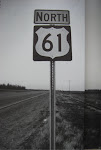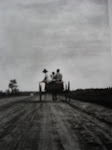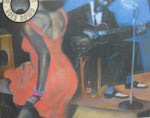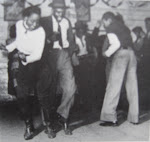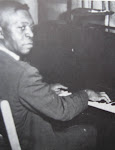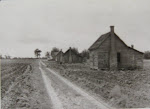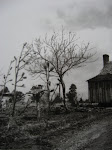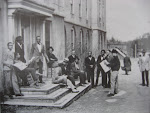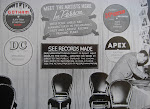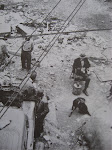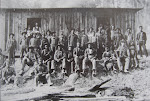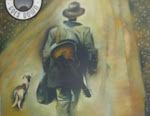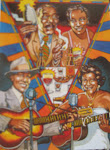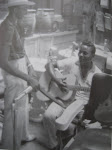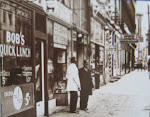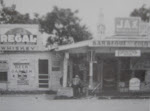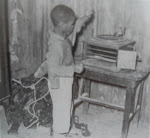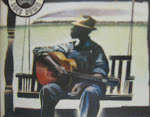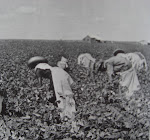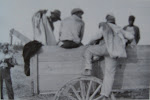
DAWN--EXTERIOR LOGGING CAMP--MOVING
This is an East Texas "piney woods" logging camp with sawmill, board shacks, and an off-shift barrelhouse tavern right on site too; its flimsy sign has a handwritten "MUD'S." Both sawmill and barrelhouse are going full-tilt as Johnson wanders into camp, carrying his suitcase and the replacement guitar strapped across his back. He passes the working area with scarcely a sideways glance, arrives at Mud's just in time to stop, allowing two men, the one helping his drunk cohort, to stumble out from inside.
DRUNK (to Johnson): Good evenin', brother!
Robert looks up at the dawn sky, then grins and answers:
JOHNSON: Evenin' to you.
He walks on inside.
INTERIOR BARRELHOUSE
One long room filled with off-shift workers--a narrow bar, a few tables, a smoke-filled atmosphere, and a battered upright piano stuck off in one corner. An old juke joint/barrelhouse pianist named Henry sits noodling riffs and runs just about as tired as the workers all around the room. Robert skirts the bar and goes over to the piano.
ANGLE ON PIANO
Johnson sets his suitcase and guitar down, which attracts Henry's attention; he turns his head to the sound, revealing dark glasses and blind eyes. And he begins playing a more complete tune, some slow blues number.
HENRY: Who that?
JOHNSON (leaning on the piano): A weary man.
HENRY (playing throughout their talk): New man too, I'd say. The voice...
JOHNSON: Uh-huh. (about the music) Tha's nice 'n' peaceful.
HENRY: Slow drag for the end o' things. You play?
JOHNSON (looking over at the guitar): Gittar. Some harp when I 'uz a kid.
HENRY: That so? What'd you' name be?
JOHNSON: Robert Johnson.
Henry stops playing long enough to hold out his right hand.
HENRY: Henry Perkins. Calls me "Blin' Boy."
They shake hands and then he resumes the music.
HENRY: Seem like I hear talk of Robert Johnson. You him?
JOHNSON (shrugs): Depen's what you hear.
HENRY (smiles): Bad blues gittar, folks say.
JOHNSON: I get on.
Henry lifts one hand to reach for his beer mug atop the piano, finds it empty.
HENRY: Mebbe we try some piano-an'-gittar after 'while.
JOHNSON: Don' min'.
ANOTHER ANGLE
Henry turns to call across to the bartender.
HENRY: Hey, Mud. Two short'uns.
Robert walks over to pick up the two mugs. The room has gradually begun emptying out as the next camp shift makes ready to start. He returns with the beers, pulls up a chair, and sits down next to Henry. He sips from his mug, but Henry takes a deep draught, then sets his aside and resumes playing.
HENRY: Well, Robert Johnson, where be you boun'?
CLOSE ON THE TWO--FAVORING JOHNSON
Robert shrugs silently, then realizes Henry can't see that motion.
JOHNSON: Wherever. Somewheres better than I been, hope to God.
HENRY (slaps his knee): Ain' that th' trufe! But you ain' soun' near old 'nuff to talk it.
JOHNSON (bitterly): How ol' you got t' be to be dead?
Henry absorbs this silently, segueing into another blues number; the talk ceases for a moment.
HENRY: Some better up North, folks say. Seem like they's movin' up there, anyway--Indiana, Chicago, an' such like.
Johnson absorbs this in silence, shaking his head gloomily.
HENRY: Yessir, that's black man's future, folks say. Mebbe I oughta roll on up that river myself.
JOHNSON (intensely): Blin' Boy, it ain't. I been there.
CLOSE ON HENRY
As he turns and answers Robert just as intently.
HENRY: Son, I be fo'ty-nine year old, near's I kin tell. Live my whole life in Arkansaw, Loo-zana, Eas' Texas--these ol' piney camps. It's damn got t' be better!
ANOTHER ANGLE
Johnson shakes his head but says nothing. He finishes his beer, and Henry resumes playing. Then:
JOHNSON: No better, jes' diff'runt.
Henry plays silently, lost in the music for a moment.
HENRY: Yeah, I 'speck you right. Hell, if'n I found it, I ain' know whut t' do wid it anyways.
Another silence as they both mull things over. Then the 6 a.m. steam whistle sounds loudly from outside; Robert is startled a bit, but Henry pays no attention.
HENRY: You hear 'bout Bessie?
JOHNSON: Hear what?
HENRY: She done pass on, coupla weeks back. Auto-mobile crash, over t' Mis'sip' or Alabam. Bled on out, folk say, try'na get inta the white man hospital.
JOHNSON (clearly shaken): God-dam, Blin' Boy. Bessie Smith cain't be gone like that.
HENRY: Well, she is. "Queen o' the Blues"? Don' make no nevermin's, it's the road we all gone down, fast or slow. (sings a line from a Smith record) "See that lonesome road, Lawd, it got to end..."
ANGLE ON THE ROOM
Now the midnight-shift workers begin streaming in, their first noisy stop the bar. Then they spread out heading for tables or the small open space meant for dancing.
CLOSE ON THE TWO
Robert and Henry have to talk loudly now to hear each other.
HENRY: Know what the answer is, Robert? Get'cha a good woman. Not no bottle--Lord knows, not these blues lines. Jes' a sof' sweet gal ta hol' onta.
JOHNSON (doubtful): I don' know...
HENRY: I'm tellin' ya, ain't I? You ever have a gal like that?
ANOTHER ANGLE
Several of the new arrivals are ready to whoop it up now.
FIRST MAN: C'mon, Blin' Boy, put me in the dozens!
SECOND MAN: Kick 'em on down!
A third man is in the dance space, all set to step out.
THIRD MAN: I got to be movin', son--where you' Ma Grinder at?
Henry waves one hand in response.
HENRY: Comin' at ya.
Then he bangs into a high-spirited, gutbucket piano stomp.
CLOSE ON HENRY
Robert leans into make himself heard.
JOHNSON: One like that a long time ago, but she took up wid somebody else.
HENRY: Well, you young, ain'cha? Git 'er on back.
Now Henry really gets into the number, swaying and rocking on his piano stool.
ANOTHER ANGLE
The workers are whooping and hollering too, some of them leaping and dancing, beer mugs right in their hands. Johnson looks lost in thought.
HENRY (shouting): Yessir, that's the ticket! One good gal!
CLOSE ON JOHNSON
He finally accepts the notion, makes up his mind, nods his head, and speaks aloud but to himself.
JOHNSON: All right, I will then...
